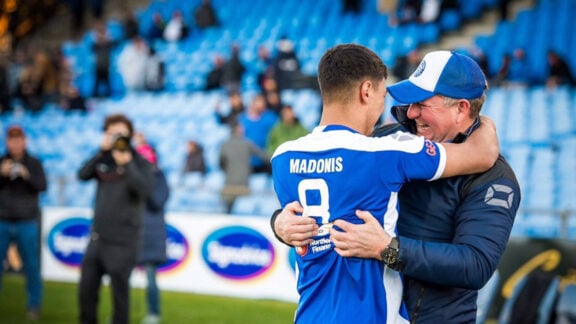The photograph has become viral, circulated through social media around the world. It depicts three elderly women, three traditional Greek ‘yiayiades’, sitting on a bench. One of them is bottle-feeding a baby whose mother, a Syrian refugee, is standing by. Heartwarming and optimistic, the photo, taken by Lefteris Partsalis, offered a stark contrast to the haunting picture of three-year-old Aylan Kurdi’s dead body washed ashore; it immediately became a symbol of solidarity, humanity and compassion, epitomising the work done by the hundreds of volunteers running to the aid of the thousands of refugees arriving daily by boat to the island of Lesbos.
Now one of the depicted grandmothers, Emilia Kamvisi, the one holding the bottle, has herself became a symbol of all the compassionate islanders, as she has been nominated for the Nobel Peace Prize, alongside fisherman Stratis Valiamos, who has rescued many refugees from drowning in the Aegean in his boat, and Hollywood actress Susan Sarandon, who spent Christmas helping refugees in Lesbos and has since become one of the most vocal advocates of the work of the people tackling one of the most important humanitarian crises of our times.
“What did I do? I didn’t do anything,” said Emilia Kamvisi, 85, when she was informed of her nomination for the $1.2 million award. The nominees were chosen by members of the Academy of Athens, the Hellenic Foundation for Culture, the Hellenic Olympic Committee and the deans of the Greek universities, to symbolically represent the “behaviour and attitude of Greece, organisations and volunteers towards the huge refugee crisis, defending the values of Peace, Freedom and Solidarity”, said the chairman of the Academy of Athens, writer Thanasis Valtinos.
Should the nominees win the award, the sum will be distributed equally to the hospitals of the islands where refugees arrive, while the award itself will be exhibited at the Acropolis Museum.
‘WE SAW PEOPLE CRYING IN THE BOATS’
Nominations closed on 1 February and the recipient will be announced in October. Although the Norwegian Nobel Institute does not publish names of nominees, there is a persisting rumour that Edward Snowden, the former US spy agency contractor and whistle-blower, is also nominated. A petition to nominate the people of Lesbos for the world’s most prestigious humanitarian award was launched online in November, gathering more than 650,000 signatures.
Because the Nobel Peace Prize must go to an individual or organisation, the experts chose three individuals as representatives of the wider volunteer effort. Last year, Greece was the main gateway into Europe for more than a million people fleeing war, persecution and poverty in countries like Syria, Iraq and Afghanistan. The debt-stricken country, suffering under the effects of an ongoing financial crisis that has seen a quarter of its population fall below the poverty line and unemployment hit record levels, has struggled to cope with the wave of refugees.
The role of NGOs and individual volunteers has been crucial in addressing the issue and providing first aid, clothing, shelter, food and water to those lucky enough to survive the journey. On the island of Lesbos, new menus and signs are in Arabic and cafes are full of refugees charging mobile phones. Bright orange life jackets cover parts of the shoreline. Speaking to Reuters, Emilia Kamvisi, herself the daughter of refugees, said the scenes reminded her of life under Nazi occupation.
“We saw people crying in the boats, people leaving their homes, people sleeping in the streets,” she said.
“People say ‘you’re a hero,’ but this isn’t heroism, it’s the normal thing to do,” said Stratis Valiamos, who has been rescuing refugees on his boat that has provided him with his livelihood. “When you’re fishing and a boat is sinking next to you and they’re screaming for help, you can’t pretend to not hear them,” added the 40-year-old fisherman.
“No one wants to leave their home, to take a suitcase and five babies and walk for five months and get on a plastic boat,” he said.
‘THESE PEOPLE ARE JUST LIKE US’
His view is echoed by the statements made by Susan Sarandon, who is nominated for the award as an example of one of the many international volunteers who have travelled to the Greek islands to help in the relief effort.
“[The refugees] are fleeing war and religious and ethnic persecution,” she wrote on her Facebook page.
“I asked a refugee mother with three small, freezing children, fresh off a dangerous boat crossing, how she could leave without a man, a destination or a guarantee and she replied: ‘Imagine you live on the third floor of a building and that building is on fire. If you stay you know you will die. If you jump there is a chance you will live. What do you do? You jump.'”
The actress has been trying to raise international awareness of the Syrian refugee crisis and the humanitarian work of the people in Greece (“our heroes”, as she describes them) ever since visiting the site last December.
“I came to Lesbos to listen and to learn,” she wrote for Huffington Post. “I wanted to see firsthand what the crossing was like for these refugees – to hear their stories and their hopes for the future. I’ll try to give them a voice. And to help the many volunteers – local and international – who are giving their time and energy during this crisis. I also came here to honour my grandfather, who left Italy for America at 15 to escape the war.”
In another post she added: “Who are these refugees? Where are they from? What led them here? Where will they go? I have come to hear their stories and learn. I hope that I can make it possible for them to have a voice so we can understand. Understand that ‘these people’ are just like us, wanting to keep their children safe. Wanting them to have a future.”








